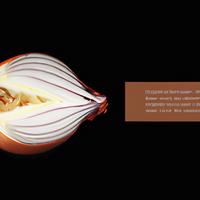
1 serving (55 grams) contains 22 calories, 0.6 grams of protein, 0.1 grams of fat, and 5.1 grams of carbohydrates.

Log this food in SnapCalorie

Nutrition Information
Calories |
66 | ||
|---|---|---|---|
% Daily Value* |
|||
| Total Fat | 0.3 g | 0% | |
| Saturated Fat | 0 g | 0% | |
| Polyunsaturated Fat | 0 g | ||
| Cholesterol | 0 mg | 0% | |
| Sodium | 6.0 mg | 0% | |
| Total Carbohydrates | 15.3 g | 5% | |
| Dietary Fiber | 2.7 g | 9% | |
| Sugars | 6.9 g | ||
| protein | 1.8 g | 3% | |
| Vitamin D | 0 mcg | 0% | |
| Calcium | 48 mg | 3% | |
| Iron | 0.3 mg | 1% | |
| Potassium | 306.0 mg | 6% | |
* Percent Daily Values are based on a 2,000 calorie diet. Your daily values may be higher or lower depending on your calorie needs.
Food Attributes
Source of Calories
About Half an onion
Half an onion is a versatile ingredient widely used in various cuisines, including Indian, Mediterranean, Asian, and American dishes. Onions are bulbs that belong to the Allium family, offering a mild to pungent flavor depending on the variety. Nutritionally, half an onion contains around 20 calories, mainly from carbohydrates. It is rich in vitamin C, antioxidants like quercetin, and small amounts of B vitamins and potassium. Onions are known to support immune function, reduce inflammation, and promote heart health due to their compounds that may help lower cholesterol and blood pressure. They are also a good source of fiber, aiding digestion. However, eating onions in excess can lead to gastrointestinal discomfort for some people. Whether sautéed, caramelized, or raw, onions add depth and flavor while providing health benefits, making them a staple in many kitchens worldwide.



